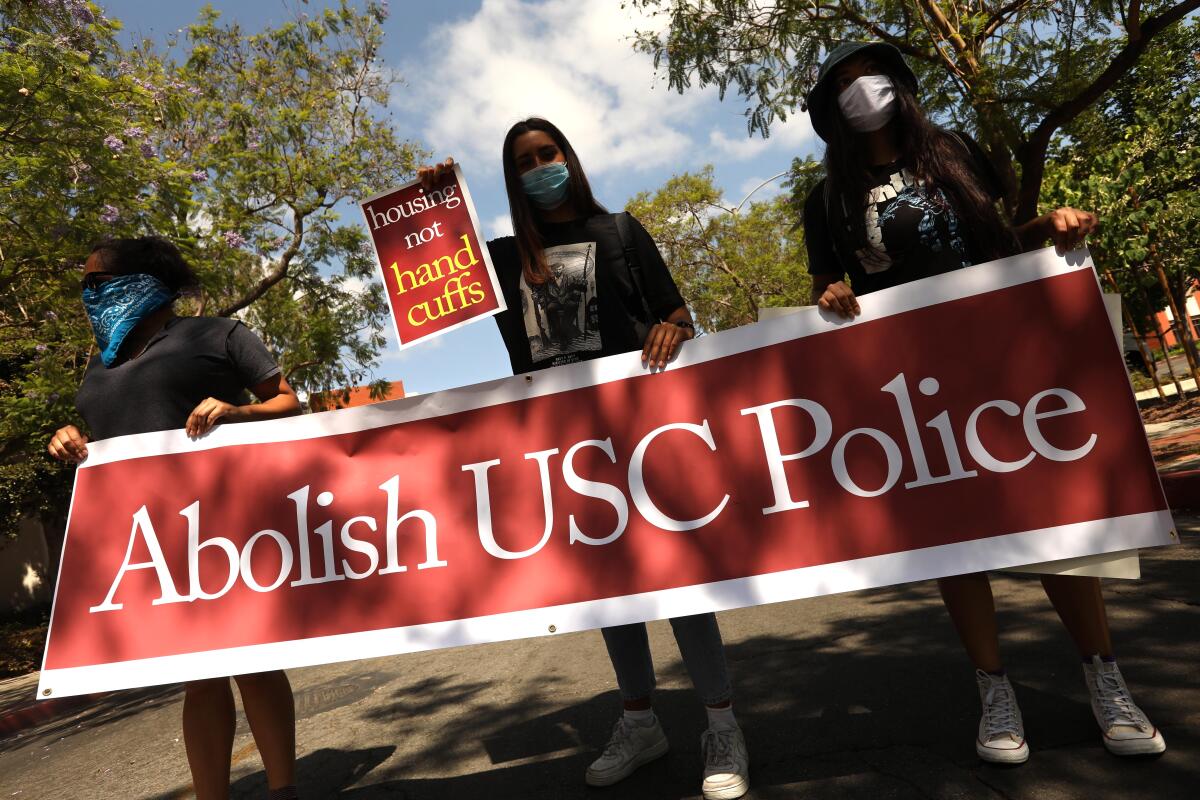If Black lives matter to colleges, they’ll divest from campus policing

- Share via
Under intense pressure from mostly Black community organizers, some local governments are responding to demands to defund the police and divest from law enforcement. The push to reduce police budgets and reliance on police intervention in noncriminal matters has been accompanied by calls to invest in more resources for people and communities.
Not surprisingly, the same demands advanced by police abolitionists off-campus have also emerged from students, faculty and staff at colleges and universities around the country. In some cases, that has already happened. The University of Minnesota, for example, responded to the demand of the undergraduate student government by swiftly discontinuing the use of local police for additional law enforcement and specialized services for university events.
Still, questions remain about whether and the extent to which campus police departments should be defunded and replaced with non-law-enforcement models for campus safety.
Since 2004, the increase in full-time campus law enforcement has outpaced increases in student enrollment. In 2011, nearly three-quarters of the 771 four-year colleges and universities in the U.S. surveyed by the Bureau of Justice Statistics employed sworn police officers.
These sworn campus officers are granted full power to make arrests by local authorities or the state. At 91% of public institutions, officers are authorized to use a sidearm (a gun or Taser) compared with 36% at private colleges. Additionally, university officers’ powers are not limited to campus locations — more than 80% of campus-based police have authorization to patrol and make arrests in areas surrounding university grounds.
This is an important point, especially for predominantly white institutions located in or near predominantly Black or other racially diverse neighborhoods. A core function of policing in our society is to protect and control white property through the demarcation of space and boundary enforcement between perceived insiders and outsiders. Boundary enforcement means routinely subjecting Black, indigenous and other people of color to profiling, harassment and forms of state and state-sanctioned violence.
In my time as a faculty member at two private, predominantly white urban universities, including the University of Southern California, I routinely saw campus police and public safety officers stop, question and push out local Black and brown youth from campus for loitering or trespassing. Many were simply walking through campus on their way home from school in groups or riding the occasional skateboard, often in ways no different from what white college students were doing.
In other cases, which a recently published study affirms, Black students, faculty and staff are often forced to verify their identity and institutional affiliation because of the presumption that they do not belong. In this way, policing on campus mirrors its role within U.S. society. The danger to Black students is made worse when white members of the campus community deputize themselves or call the police to deal with what they perceive as threats by the presence of Black people in classrooms, residence halls and elsewhere on campus grounds.
Overlapping policing patrols make Black students even more vulnerable to police harassment. Last October, I received a phone call from one of my former students at USC, who, after making a U-turn to get into a vacant parking spot, was harassed by a Los Angeles police officer upon exiting his vehicle. According to my student, who is Black, the officer not only interrogated him about whether he was a student (he explained that he was late for class), but also escalated the situation with verbal abuse and threats of arrest.
Although my student was not physically harmed that day, other instances in which campus police have shot and killed Black people near campus illustrate how the joint patrols are conduits for expanding the police state across the “town and gown” where school and society intersect.
Making it safer for Black people to live, work and learn requires universities to develop measures that lessen the need for boundary enforcement. This means investing in the needs of Black and brown people on and off campus and helping to preserve the surrounding communities rather than changing them, which creates boundaries where they did not exist.
This also means moving to non-law-enforcement alternatives like prevention programs to deal with drug and alcohol abuse, mental health needs and sexual or intimate partner violence. For that, universities need to increase hiring of Black mental and emotional health professionals to support students and provide survivor-centered care to Black women experiencing campus sexual violence rather than the often re-traumatizing interventions offered by police.
By defunding their police, colleges and universities will have more resources to redirect toward effective solutions like trained mediation and trauma response teams to de-escalate conflict and repair harm.
If Black lives matter to colleges, then we must seriously reckon with the anti-Black systems and structures embedded in everyday campus life. At a minimum, that starts with divesting from campus policing.
Charles H.F. Davis III is an assistant professor of higher education at the Center for the Study of Higher and Postsecondary Education at the University of Michigan and the director of the Scholars for Black Lives Collective.
More to Read
A cure for the common opinion
Get thought-provoking perspectives with our weekly newsletter.
You may occasionally receive promotional content from the Los Angeles Times.









